Fly fishing is an ever-evolving sport with an ever-evolving set of rules, conventions and ethics which accompany it. In most areas of the world, what anglers consider everyday fly fishing tactics and techniques have traveled great distances from the dry-fly-cast-upstream-only ethics of England's 19th century chalk streams. Wherever the boundaries of fly fishing lie at one particular time or another, one thing that is certain is that anglers are always looking for ways to push the envelope. Currently, the use of added scents in fly fishing is a controversial topic. Some anglers have chosen to add scented gels and floatants into their arsenal with the simple goal of getting into more fish. Certain scents are known to attract fish and may also be useful in covering up natural and unnatural human odors that may repel fish. Others have been critical of this approach, most often citing the notion that the use of scents takes the "fly" out of "fly fishing", rendering flies little more than new forms of bait. Other opponents flat out call it cheating.
So, what's the reality? Are scents a way of cheating your way into more fish without developing your skills as an angler? Or are they a new and innovative way of expanding the boundaries of our sport that, in time, will be looked upon as a commonly used tactic not unlike other formerly new methods and techniques that were once considered taboo?
We reached out to some of our favorite people in the world of fly fishing (as well as folks that happen to know a thing or two about it) and asked them.
Using scent is not "cheating," it is just another method of attracting fish to the fly. However, most fly fishers eschew the use of scent because they view fly fishing as using artificials that are widely separated from bait, and one of the attractions of bait, of course, is the scent. Most think that scenting the fly would not be any different than bait fishing. Fly fishers seem to want the fish to accept the reality of the fly by its looks, rather than by its smell.
Fly fishing, we must remember, is not a sport developed by the fish. It is totally a human activity with human limitations as to the type of lure and type of tackle. So, to scent or not to scent? If you do, probably best to keep it to yourself, at least at this time juncture.
I guess it really boils down to each angler's personal views. I messed around a little bit with smelly jelly scent attractor on some flies a few years ago and I honestly couldn't see any difference in hookups over non-scented flies, that is for trout at least. Is it borderline cheating? I think most would say, yes. On the other hand, people use artificial rattles and blades (for sound and flash) in flies to add attraction, and despite them not being a natural tying material, no one seems to have a problem with it. People also us UV sprays to enhance the natural colors of flies, and no one has a problem with those either.
When you look at scent attractors used on flies it's really just another way to stimulate one or more of the senses fish use to help them determine whether what they're looking at is a food item or not. I'm not going to look down on someone doing it, but I don't think you'll ever see it legalized in competitions. I once heard of a guide putting fish food in a zip lock bag with his flies overnight before his guide trip the next day for stocked trout. Would I ever do that? Hell no, that's the definition of cheating and half ass guide, but you may find me pricking my skin with the hook to dab some blood on my shark fly if I was fun fishing and the sharks weren't cooperating.
This is something to be decided by each angler. I have clients that would cringe at this idea and others that just want to feel the tug on a fly rod no matter how it works. I generally believe that the art of tying a fly is to make it look good enough and move correctly enough in the water to entice a fish to eat and scent shouldn't be added because if it is then those things don't really matter. An example of that is guys catching fish on scented baits when spin fishing that look and move nothing like what they should if at all. On the other hand if a guy just wants to feel the tug I understand that too.
If an angler abides by all local stream regulations/laws (some protected trout streams prohibit the use of any natural or man-made addition that attracts based on scent or taste), I see nothing wrong with using scented products on flies. In fact, it should be embraced; as anything that puts more fish on a beginner's line and instills confidence is a good thing.
It is to be expected that most purists will be disgusted and consider it blasphemous to even suggest the use of scents, but fly fishing is slowly adopting and embracing some of tactics employed by our "conventional fisher-friends." One needs to look no further than the most recent "Product Issue" of Angling Trade to find three different fly patterns (think Crank Bait and Spinner Bait) that look more at home in a tackle box than on a fly patch (Schmidterbait , Game Changer, and the Schmidterbug). The use of UVF and UVR tying materials is yet another method adopted from the conventional arsenal that is just beginning to gain ground as anglers are educated on how fish see and perceive their prey.
The experimentation of scents on flies has probably been around as long as the sport itself, though very few will openly admit to it. There are hundreds of forum topics through-out the interwebs that tip-toe around the topic including: "Second-hand" stories of "old-timers" rubbing Skoal spit on streamers, smearing Cheetos (pun intended) residue on a dry fly, and soaking egg patterns in fish oil.
Whether you rub your fly in stream muck, use products that contain "odor-masking pheromones to hide human scent," use conventional bait scents or processed cheese products; it certainly could be perceived as "cheating" depending on where you draw the line and which side you find yourself on.
Editor's note: High Horse manufacturers and sells premium fly floatant in various configurations, including traditional, scented and UV-infused.
I use scent. I have no problem with scent. There certainly are those who look down upon people who use scented flies but there are definitely times where it makes a huge difference especially with carp and pressured steelhead.
One of my favorite stories about scent is one time when I was fishing with [a client] for carp in Lake Champlain. The fish were being snotty and after a bit he turns around to me and says "ya got any jizz to put on the flies?" I did, and anise made the difference.
I just have no issue with it. It is legal, it is available. It isn't live bait. It still doesn't replace a good cast or a good presentation, but instead gives a bit of advantage in a pinch with difficult fish. I don't use scent often and only with fish that are being really difficult or if water is very high and muddy.
Honestly I think that if more people would come down off their high horse and stop worrying about things like scent or considering buggers to be cheating they would enjoy our sport more. Let folks do what they do as long as it is legal where they are fishing. The rest of it is just semantics.
We all draw a personal line in the sand on what we define as fly fishing. Some anglers believe if you're not fishing dry flies upstream to rising fish with a bamboo rod you're not fly fishing. (I'm not one of them.) Personally, I have thought about using sent on my flies more than once. My motivation is not to attract the fish as much as to cover up human scent, gasoline, sunblock or that funky aroma marabou gets over time. I've never crossed that line simply because in my mind, fly fishing is about the process more than the end product.
In short, we choose to fly fish because it's challenging. Right? By scenting our flies that philosophy changes. If production is truly what we seek, and we're willing to cross the line of scent, why not just use a spinning rod?
I don't think it's "cheating" unless fishing regulations expressly forbid scents, but I think it's a crutch. To me, the appeal of fly fishing is being able to hook and land fish with "minimalist" resources. If you're at a point where you think "glugging" flies is going to make or break your day, you probably have other issues with your fly-fishing skills that are more worthy of attention.
That said, who am I -- or who is any angler for that matter -- to insist what is fair and what is foul? Seriously, we use bobbers but call them strike indicators. Is a "spoon fly" a fly at all, or is it really a lure? Are foam flies, or bead rigs, or things that aren't made of fur, thread and feathers really flies? Maybe not in the traditional sense, but they sure work.
When it comes to fishing, I try not to judge anyone but myself. I'm in favor of letting people choose their own means to find fulfillment in fly fishing. So long as they play by the regulations. Whether you think a good day is catching 50 trout with a San Juan worm and a bobber, or tricking one wild brown with a size #20 dry fly, or even scenting your flies… I say go for it. After you land enough fish, your own parameters of fair and foul tend to adjust themselves.
Where do you stand on the use of scents in the world of fly fishing? Is anise, shrimp or any other scent currently in your fly box? Will it ever be? Share your thoughts in the comments below.


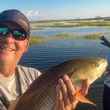

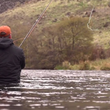
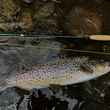



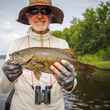
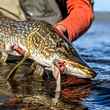

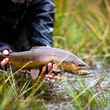

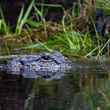

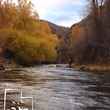
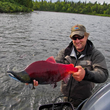


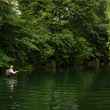

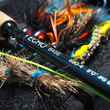

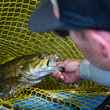





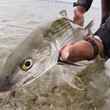
Comments
ginkthefly replied on Permalink
This is up to the angler, entirely.
Those lures that Ben linked aren't for me (well, maybe the Game Changer) and neither are scents. But, I think dry-fly only purists and the like are full of crap. So, to each his own. Everyone has to decide what they can live with, other's opinions be damned.
DDon replied on Permalink
I've only used scent once or twice, and only when hunting finicky carp. Never carried it, but some of the carp folks I've fished with swear it makes or breaks many a day.
I guess it all comes down to how good the day is BEFORE you bring out the scent. :)
Paul Snyder replied on Permalink
My knee-jerk reaction is leave the scenting to the spin anglers. A great deal of the allure of fly fishing for me is the challenge as it exists - sans scent. It's taken me a long time to use big, articulated streamers, so maybe my position on this will change over time as well. For the moment, I'm inclined to go with Gink's position: decide what you can live with and go with it.
Chad Shmukler replied on Permalink
And I'm inclined to agree. What satisfaction you derive from each successfully landed or hooked fish is based on the parameters that each angler establishes for his/her self. For some, a fish caught any other way than on a dry fly is one taken unfairly. Me? I'll nymph the crap out of any river and feel just as good about each fish I hook up that way as the one I take on a size 24 BWO (okay, maybe not AS good, but still pretty damned good).
Fish your way, as long as it's not dangerous to a fish you intend to release.
redux replied on Permalink
To me the difference between bait, spin, and fly casting is METHOD OF PRESENTATION.
Chad Shmukler replied on Permalink
Is that to say that scenting is irrelevant in your mind? I'm assuming that a scented fly would be presented no differently than an un-scented one ...
redux replied on Permalink
It is irrelevant to me. I've read Gierach talk about doing stuff to take the scent off flies. I think he mentions mud helping to reduce the scent. Anyway, it's the same thing to me.
Also, I see a lot of flies that imitate lures/jigs and have a ton of weight and rubber on them. The article also mentions a lot of non-traditional fly fishing methods in use today.
As long as you are using something artificial to trick the fish and not using real fish food I don't see the difference other than how you get it in front of the fish.
That's just me. Try fly fishing from shore on Florida's lakes/ponds with a 9" fly rod. You will soon see the logic of spin and bait casting. Although, you will miss the grace of the fly.
KC Biehn replied on Permalink
Never used before and never will. It's not about catching it's about the experience and gaining the experience to catch. Just my 2 cents.
Chris replied on Permalink
Many people want to reach the summit without walking the trail.
vokel replied on Permalink
It's not something I would use regularly, but something I wouldn't mind having in my bag, just in case. I think there are certain species and certain times when nothing else may work.
Jim Wilson replied on Permalink
Here in North Carolina, the use of scented attractants is forbidden for most of our trout stream designations. We define an artificial lure or fly as a lure "that neither contains nor has been treated with any substance that attracts fish by the sense of taste or smell." A lure that has been treated, falls into the natural bait category, and natural bait is forbidden for use on most of our stream classifications. Attractants would be forbidden for most wild trout streams and all delayed harvest streams. Because natural bait is legal for hatchery supported streams, attractants would be legal there.
Mike Miller replied on Permalink
All scents need to be band in fly fishing as well as the lure style. Spinning, baits, snagging etc. needs to be stopped on all trout waters. If that is the only method that you can catch a fish on, find something to else to do.
Ross Slayton replied on Permalink
My buddy puts krill scent on his rubber legs and straight slays the trout here in eastern Idaho. I dont blame him when the fishing gets tough. Heck, if I could get a worm to stay on the hook when Im casting my rod I would sure as heck give it a shot when the fishin is tough
Missouriflies replied on Permalink
I believe that as fly fishing takes on new frontiers ...like the lower Missouri and middle Mississippi rivers.. a fly tier would be remiss to not to learn lessons from the old timers, the limb liners, the hillbillys and the rednecks. Fly was established in my mind for crystal clear trout streams...my water is mud all the time... should I be expected to just accept that while the the limb liner is taking 50-60 blues, flatheads etc in a single night, i might not even take 1. you would also be dumb if you didn't notice you take a lot of catfish on rubber legged flies. maybe one type of leg that when you smell it it stinks. Hmmm? to scent or not. ? from now on im going to try my hardest to scent it up the wazo. who cares if you bait fish with your fly rod if your catching big fish when you otherwise wouldn't be. just do it... but keep it real. no DW40.
Eric Brooks replied on Permalink
Although I am a just beginner to fly fishing having recently retired, I am not sure why scent should looked down upon by anyone who isn't adhering to the dry fly upstream only school and using only flies they tie themselves. I have not purchased any scent to use yet, but I am experimenting with bacon grease as a floatant. I haven't noticed much of a difference. Then again it is probably just my beginner technique.
Warren replied on Permalink
Regardless of what is considered to a be a true fly fishing, scented or not. It all has to be dependent on the species you are fishing for and how your going about it. I for one have never you used "scent" on a fly ever, but frankly who doesn't love to land fish. It all just depends on your outlook on the sport as a whole, wether your a dry or die guy, one who just wants to land fish or, just a fly purist. The bottom line is it's up to you; i personally would never add a scent to a fly, for me it's more about the presentation, fly selection, and the challenge of matching the hatch. Thats why I never, ever, spin fish.
riverrambler replied on Permalink
Keep in mind that in some states like Wa, using scent is considered using bait so when when the regs say artificial lures only, you can't use scent.. As far as fly fishing is concerned, I think the fly is about 5% of fly fishing. Spotting flywater, casting in difficult conditions, manipulating the line/fly for effect and presentation and fighting and landing a large fish with a fly rod/ reel make up the rest. All the purists out there aren't really all that pure. Even dry fly only is a modern way of fly fishing. Humans have mostly used sinking flies for the last couple thousand years or more.
Ever notice that a chewed up ragged fly at times will catch fish after fish? That's because of the scent pheromones from the previous fish caught.
I've experimented with scent in the past, stuff like vanilla extract, crushed garlic and crushed anise seeds to cover scent from my hands on sensitive fish like Chinook.I've also used de-scenting soap to wash my hands, another modern hi-tec invention. Haven't really noticed a bigger hook up rate so I don't bother. The only judgment I make on fly fishing are on those that leave a trail of garbage and those that lack river etiquette, something that's becoming more and more common these days.
Pages